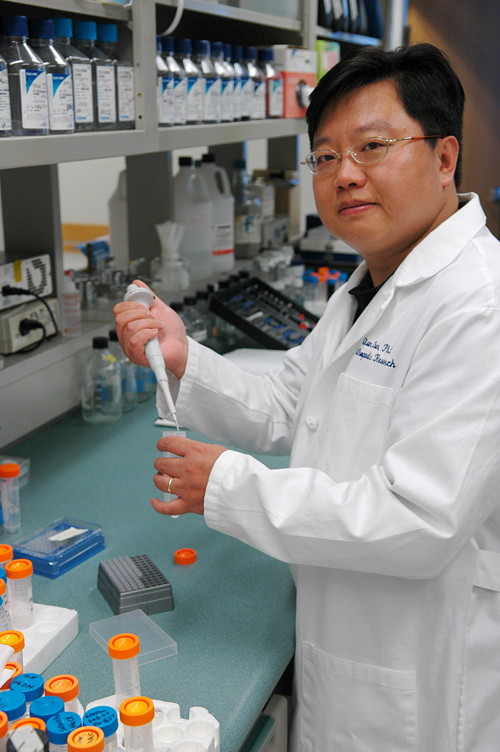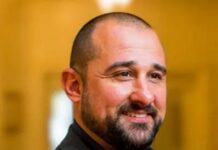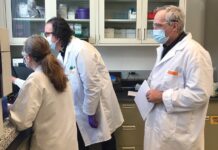
A Rhode Island Hospital doctor and a senior investigator, who ordinarily wouldn’t have the chance to work together, think they have found a way to help researchers more quickly diagnose joint injuries.
Gregory Jay, an emergency medicine doctor at Rhode Island Hospital, is studying a protein on the surface of the joint. Braden Fleming, a senior investigator in the bioengineering laboratory at the hospital, is studying trauma-induced joint injuries.
They believe the protein could be used as an early marker for joint injury. If they are right, it could lead to earlier treatment, said Qian Chen, director of cell and molecular biology and head of orthopedic biology at Rhode Island Hospital.
Jay and Fleming came together because of an $11.1 million research grant for the multidisciplinary study of skeletal joint diseases.
Their conclusion, which hasn’t been presented to the medical community yet, is an example of the type of innovation Chen hopes will continue to flow from the hospital’s new Center of Biomedical Research Excellence (COBRE), one of 71 in the country.
Rhode Island Hospital’s newest COBRE is focused on skeletal health and repair. It was established by the 5-year grant awarded by the National Center for Research Resources, part of the National Institutes of Health.
It is the second COBRE grant the hospital has received. The first COBRE grant awarded in 2002 led to the establishment of the state’s first Center for Cancer Research Development at the hospital. All COBRE grants require that there be a multidisciplinary aspect to the research conducted.
“In order to do good science we have to be multidisciplinary,” Chen said. “Innovative treatments are often the result of multidisciplinary research.”
Investigators and mentors in the COBRE program are from five departments in the hospital and Warren Alpert Medical School at Brown University, including orthopedics, pediatrics, emergency medicine, medicine and bioengineering.
The new grant will fund five junior investigator projects, Chen said. The first two deal with skeletal development and pediatric diseases.
“We want to prevent limb deformities that occur in young children,” he said.
The next two grants will examine how cartilage degenerates in adult joint diseases, including bone cancer and arthritis induced by trauma or sports. The last project will focus on how to better repair and rebuild healthy cartilage joints.
“Now, if you have osteoarthritis, the treatment is surgery, surgery, surgery,” Chen said. “An artificial joint only lasts 10 to 15 years. Now that people are living longer and longer, what we’re trying to do is replace a joint with live tissue, so it can regenerate and repair itself.”
The COBRE program will allow three clinicians to conduct research in the lab as junior investigators. They will be mentored by a senior investigator during that process.
Mentoring is an important aspect of the program, Chen said, because it will allow the junior investigators to gather preliminary data, which could lead to attaining federal grants for further study.
Often clinicians don’t have the time to apply for federal funding for research because they are so absorbed with their day-to-day patient load, he said. The grant will pay for 50 percent of their time so that they can work in the lab for half of their day and treat patients for the other half.
Having clinicians in the lab also will benefit research conducted by the senior investigators, who might be biologists or bioengineers that spend most of their time in the lab, because the clinicians are on the front line of care.
“We realize their existence is critical to the treatment of patients,” Chen said. “They know exactly what is needed.”
The grant also will fund new imaging microscopes and other lab equipment. About $500,000 is being used to renovate and expand the lab by about 4,000 square feet.
Chen said research conducted by the COBRE is extremely important because more than 40 million Americans suffer from joint disease and the number will continue to increase as baby boomers age.
“The goal is to improve people’s quality of life,” he said. “They live longer, now they need to live better.” •












